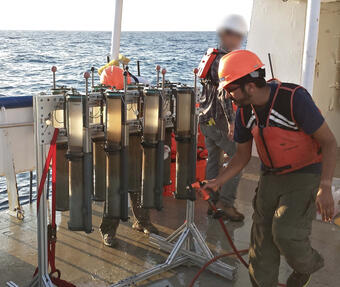Celebrate the Ocean! June is Ocean Month
Nearly two-thirds of our planet is covered by water with more than 120 million Americans living near an ocean or Great Lake. Celebrate Ocean Month and learn more about USGS ocean science research! And, check out the June 11 News Release from The White House, “Ocean Policy Committee Delivers on Strategies and Recommendations to Advance Ocean Exploration”
Nearly two-thirds of our planet is covered by water with more than 120 million Americans living near an ocean or Great Lake. Growing worldwide demand for natural resources will increase our dependence on coastal and marine environments while people, infrastructure, and ecosystems face increasing risks from hazards. USGS Coastal and Marine Hazards and Resources scientists and staff study coastal and ocean resources and processes from shorelines and estuaries to the continental shelf and deep sea so that we can fulfill our vision for a nation prepared for coastal and ocean changes.
“The USGS is proud to be an interagency partner in the efforts to increase American exploration of our planet’s ocean..." - Dr. Jim Reilly, USGS Director. Read the White House News Release from June 11, 2020.
- Explore the USGS Coastal and Marine Hazards and Resources Science Strategy
- Sign up for Sound Waves, a USGS newsletter
Learn more about the science behind USGS research, in and on the ocean.
Get Our News
These items are in the RSS feed format (Really Simple Syndication) based on categories such as topics, locations, and more. You can install and RSS reader browser extension, software, or use a third-party service to receive immediate news updates depending on the feed that you have added. If you click the feed links below, they may look strange because they are simply XML code. An RSS reader can easily read this code and push out a notification to you when something new is posted to our site.





